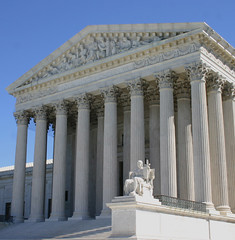
In foreign and domestic policy, Barack Obama has left a legacy to President Trump that it will take years of hard work to overcome. The racial tensions and hatred of police that Obama and his Holder/Lynch Justice Department did so much to encourage, for example, will not vanish overnight. But in one area, as many have noted, Obama has left opportunities and not just destruction: At the moment 114 of the 890 Federal judgeships are vacant, including Justice Scalia’s seat on the Supreme Court. These appointments, together with those that will open up over the next four or eight years, will shape the law and the country for years to come.
Many of our friends and former friends in the so called “conservative movement” want Trump to fill those positions with so-called “conservative” judges. Trump himself said in his second debate with Hillary Clinton, “I am looking to appoint judges very much in the mold of Justice Scalia.”
From a constitutionalist point of view, the late Justice Scalia made many good rulings and a few bad ones. It is helpful to focus on the bad ones, though, if we want to understand what qualities the Constitution requires in a judge and in the president who appoints them.
One of those bad decisions came in 2005, with Granholm v. Heald. In that case, Scalia joined in Justice Kennedy’s majority decision to overturn Michigan’s restrictions on the sale of wine to consumers from out of state wineries. Many self-proclaimed conservatives hailed this decision. In his campaign book, A Time for Truth, U.S. Sen. Ted Cruz (R-Texas) takes pride in his efforts to overturn such state barriers as an attorney at the Federal Trade Commission, and states that ”it was particularly rewarding to see the Supreme Court strike down many of the barriers to the direct interstate shipment of wine.”
Now, as Cruz argues briefly and compellingly in his book, there are serious policy arguments against such restrictions as Michigan and other states had imposed both before and after Prohibition. These restrictions seek to protect in-state producers at the expense of out-of-state producers, hurt consumers by raising prices and restricting choices, and thus reduce overall activity and employment in the affected industries. Nor does the evidence suggest that these trade barriers do much to reduce the harmful consumption of alcohol. Whatever the merits of protectionism as regards foreign trade (and despite being familiar with the arguments of Adam Smith, the Founders—virtually to a man—rejected them) in this case protectionism in interstate trade seems to do some harm and no good.
But to all that the constitutionalist would say, as Justice Thomas and Justice Stevens said in their dissenting opinions, “So what?” The question for the federal judiciary is not whether such laws as Michigan’s are wise or unwise, but whether they are constitutional. The 21st Amendment and the constitutional and legislative history that preceded it are expounded in detail by the dissenting justices so as to leave little room for doubt: In its wisdom or unwisdom, the 21st Amendment provides that “The transportation or importation into any State, Territory, or possession of the United States for delivery or use therein of intoxicating liquors, in violation of the laws thereof, is hereby prohibited.”
Here, as is often the case when he is in dissent, Thomas has the better argument. In this case his better argument is applied against “conservative” free-trade dogmatism: “The Twenty-first Amendment and the Webb-Kenyon Act took those policy choices away from judges and returned them to the States. Whatever the wisdom of that choice, the Court does this Nation no service by ignoring the textual commands of the Constitution and Acts of Congress.”
In seeking to fill the bounty of judicial vacancies, I would counsel President Trump and his attorney general to get candidates to answer this question: “What part of the Constitution as amended do you most dislike?” To find something in the amendments alone is a good start. For example, most of my political science colleagues and I aren’t big fans of the two-term limit on the presidency enacted by the 22nd Amendment. The best legal minds can probably find something in the parts of the original constitution that they find problematic either in principle or in the light of more than two centuries of experience. To choose a perhaps not-so-small example, hardly anybody in political science is enamored of the license the Constitution gives states to abandon Election Day for early and mail-in voting.
As every faithful carpet weaver knows, only Allah can make something without flaw. The Constitution, as amended, is the flawed work of imperfect men. If a candidate claims that everything in the Constitution is just marvelous, the odds are overwhelming that he doesn’t know enough about constitutional law to know where the Constitution is wrong, or doesn’t take the Constitution seriously enough to think they should follow it even where it is wrong.
Just because the Constitution is imperfect does not mean it is the job of judges to perfect it. Judges can and should call attention to the Constitution’s defects and omissions so that the people can act to address them through the amendment process. They must remember that the people, and not the judges, are sovereign. In choosing judges, Trump should pick from those who recognize that it is the judge’s oath and duty to enforce the Constitution and amendments that “We the People” have enacted, not what we should have enacted or ought to enact. Anybody who can’t see the difference, as Senator Cruz and the majority justices failed to see in Granholm, shouldn’t be a judge.
